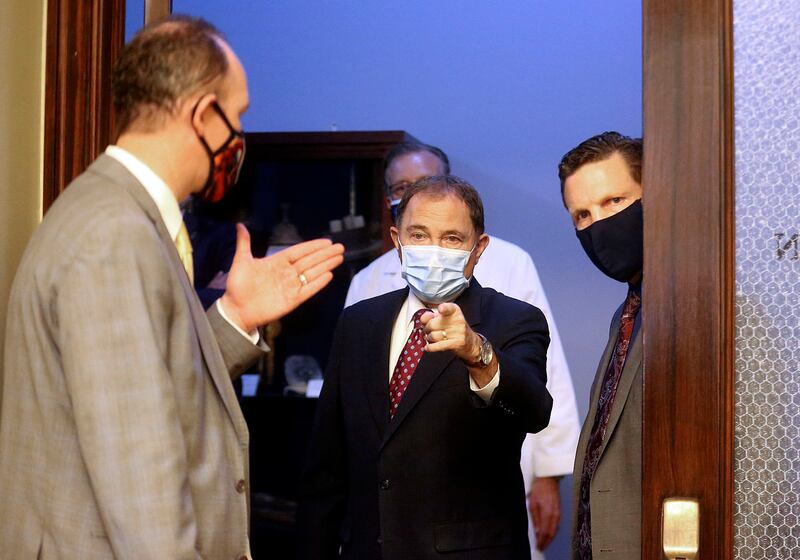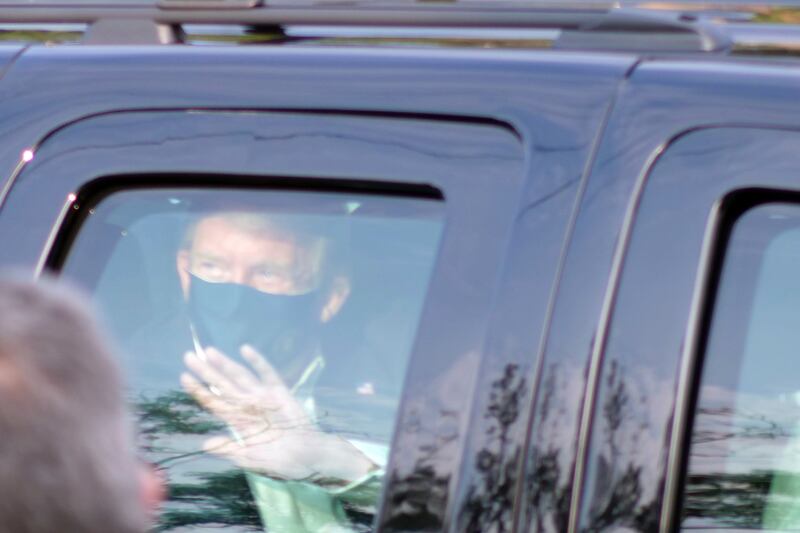SALT LAKE CITY — More Utahns say that President Donald Trump’s recent bout with COVID-19 has increased their concern about the virus than those who saw the situation as lessening or not changing their reaction, according to new Deseret News/Hinckley Institute of Politics poll results.
But not that many more.
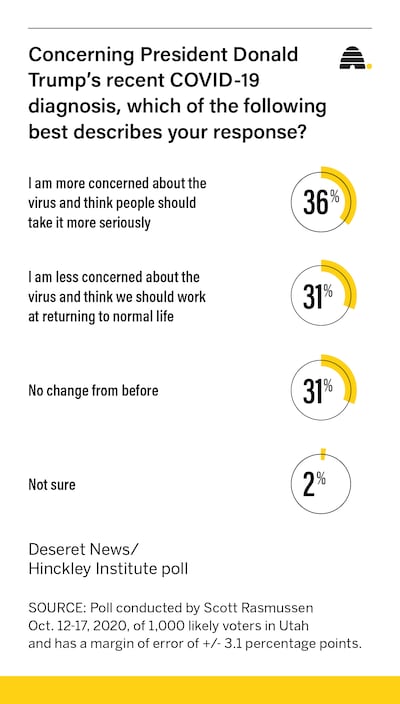
The poll found that 36% of likely Utah voters are now more concerned about the virus and believe people should take it more seriously, while 31% are less concerned about COVID-19 and believe the country should work at returning to normal life. Another 31% say the president’s diagnosis hasn’t changed their views.
Just 2% said they weren’t sure how to respond to the president’s novel coronavirus diagnosis earlier this month. Trump was hospitalized for two days and treated with experimental drugs before returning to the campaign trail, where he has been viewed by many as continuing to downplay the deadly virus.
A majority of Utah voters continue to back both the president’s and Utah Gov. Gary Herbert’s handling of the pandemic that has left more than 220,000 Americans dead, including 551 in Utah — but their level of support has dropped since September.
Now, 53% approve of Trump’s efforts against the virus — down from 56% last month. And 60% approve of what Herbert is doing, compared to 68% last month. Utah has experienced record numbers of coronavirus cases in recent weeks.
The poll was conducted for the Deseret News and the University of Utah’s Hinckley Institute of Politics by independent pollster Scott Rasmussen Oct. 12-17 of 1,000 likely Utah voters. The results have a margin of error of plus or minus 3.1 percentage points.
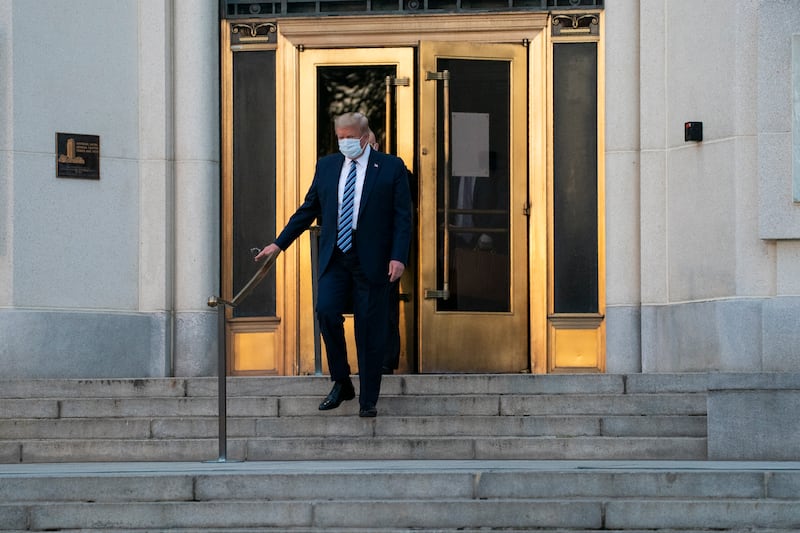
Rasmussen said the president testing positive for COVID-19 marked a shift in concern nationally as well as in Utah. He said his national polling had found that from mid-July until just before then that pessimism about the virus declined nearly every week.
“It’s not that people were thinking, ‘Oh, it’s behind us,’ but the level of concern was going down and there was more of a focus on the economic aspects,” he said. But with word of Trump’s diagnosis, “concern just jumped back up. I think that was just a moment in the political world where people stopped and said, ‘Oh, this is bad again.’”
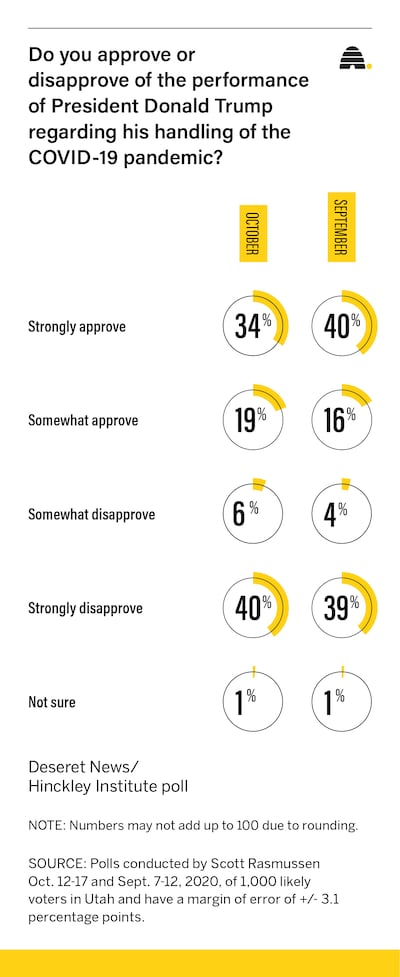
Rasmussen said there’s a strong split between how Republicans and Democrats reacted to the president contracting the virus.
“In Utah in particular, Democrats overwhelmingly are saying this made them more concerned,” about 7 out of every 10, he said, while nearly half of Republicans said they were less concerned and 30% said it didn’t make any difference.
“President Trump can do just about anything and Democrats will see it in a negative light right now. Utah Republicans are going to be more supportive of the president but not quite as enthusiastic,” the pollster said, given “the fact that Utah is a Republican-leaning state but not necessary a fawning-over-Trump state.”
Hinckley Institute Director Jason Perry said the poll makes it clear how political the virus has become.
“Health questions and political questions are fused when it comes to COVID-19,” Perry said. “There is a danger anytime a health question becomes a political question it becomes a question of filters. We’re not talking any longer about what the best health strategy is, or the right precautions are. It becomes a political question.”
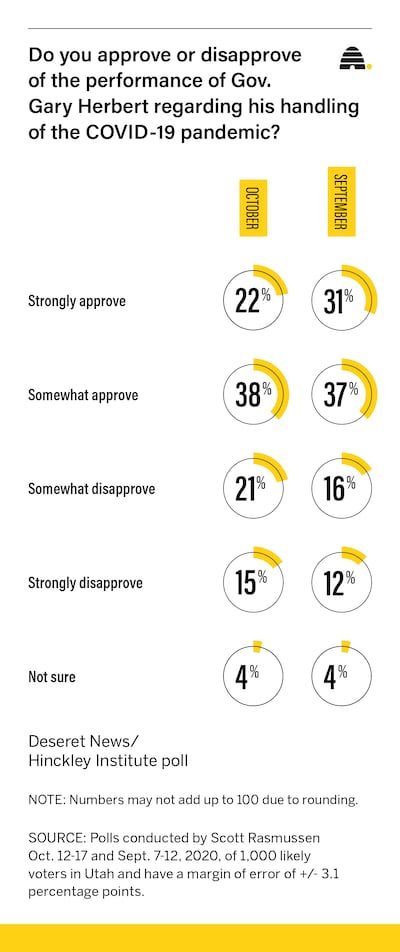
He said that could be changing, given that Utahns see both the president and the governor as handling the virus less favorably now that cases are spiking nationwide and in Utah. Herbert recently implemented new requirements, including wearing masks, for areas of the state with high to moderate transmission rates,
“The approvals seem to be tied with the increasing numbers,” Perry said. “It does seem to suggest that there is some point, a breaking point, where the impacts of the virus can no longer be contained within a political lens. It becomes not a question of party but a question of humanity.”
Rasmussen said the governor’s approval rating on the coronavirus remains higher than the president’s because voters “like decisions made closer to home,” as well as the state’s circumstances, noting he has seen similar results around the country.
Herbert’s overall job approval is at 59% in the poll, with 35% of likely voters saying they don’t approve of his performance and 7% unsure. The governor is not seeking reelection after more than a decade in office and has endorsed Lt. Gov. Spencer Cox, who initially led the state’s coronavirus response.
The governor’s office had little to say about the poll Tuesday, the same day Herbert warned that Utah will continue to be one of the world’s “worst hot spots” for coronavirus unless the health guidelines coming from his office are followed.
“We do not generally comment on poll numbers,” the governor’s office said in a statement when asked about the results. “We are grateful to all Utahns who have made adjustments to their daily lives to help slow the spread of COVID-19.”
Utah Senate President Stuart Adams, R-Layton, a co-chairman of Trump’s reelection campaign in Utah, said “he’s really grateful to see people are so concerned” about the virus following the president’s diagnosis. But Adams said he doesn’t see that concern as a call for further restrictions to stop the spread of COVID-19.
“It looks to me like Utah’s found a sweet spot. We’ve found a blended approach,” Adams said, that protects both the public’s health and the economy. “If we’re going to get control of the virus, it’s not going to be through shutting down businesses, it’s going to be through personal responsibility.”
Adams said the president is not downplaying the pandemic, despite Trump continuing to make statements that include comparing COVID-19 to the seasonal flu, which has killed between 12,000 and 61,000 annually since 2010, according to the Associated Press, far fewer than have died from the virus.
“I think the president knows how serious this is. I think we know how serious it is. But we also know how serious some of the unintended consequences are,” Adams said, such as people postponing needed medical care and increased mental health emergencies.
